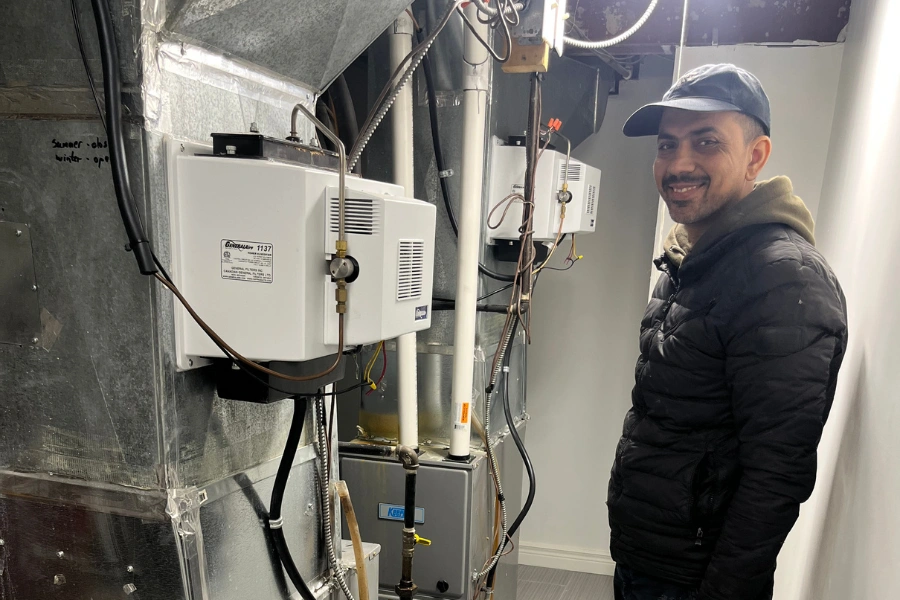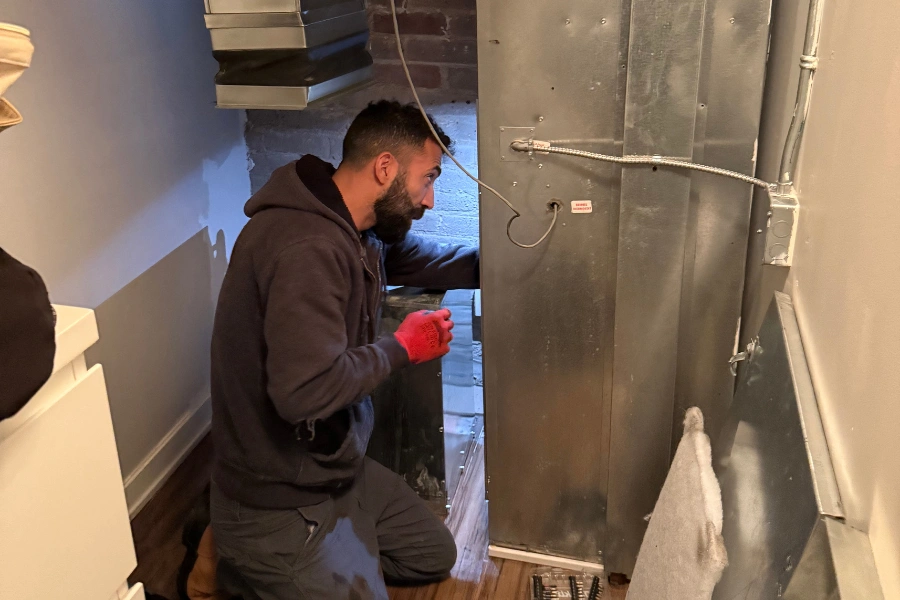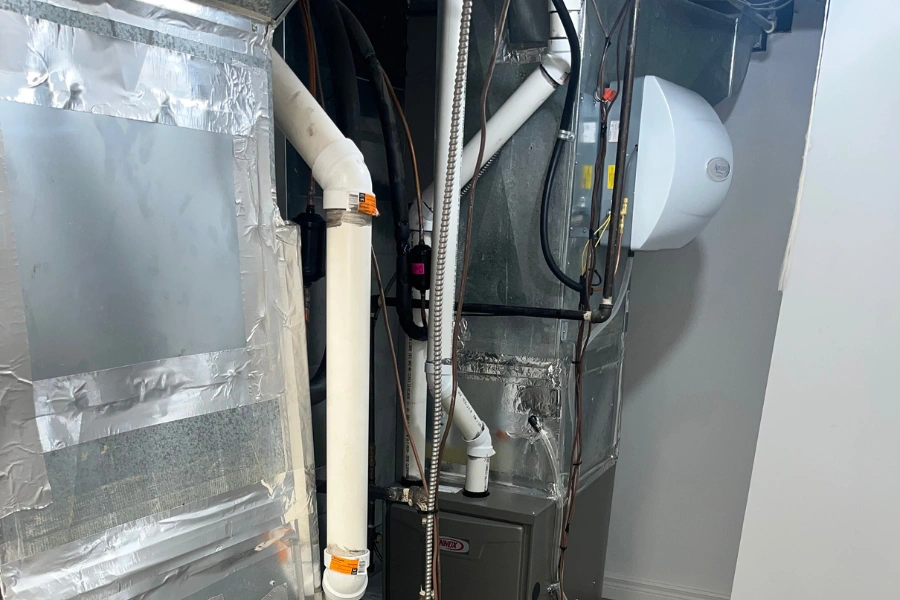With the summer just kicking in, we know it’s frustrating to have to deal with a dying air conditioning unit. High temperatures come with even higher expectations for your air conditioner. If you’ve been dealing with high energy bills, frequent AC repairs, or just an overall decrease in the quality of your AC, then it might be a sign that your AC is not handling heat well. We’ve seen it happen too many times, especially during the summer. But if your system gives you signs that it needs your attention, listen to it. Otherwise, it can lead to discomfort for you and your home.
Let’s really get into the nitty-gritty of the warning signs your AC will show you if it can’t handle the summer heat this year. We help homeowners identify issues and fix cooling units efficiently so that you don’t have to worry about walking into a scorching home this summer.
Why Should I Replace My AC This Summer?
Changing up your AC habits now can mean big savings and a cooler lifestyle in the long run. It might be hard to identify signs that your AC is not keeping up with the heat from outside. We’ve highlighted 10 signs you might want to watch out for:
1. AC Blowing Warm Air
If your AC is blowing warm or lukewarm air instead of cool air, that’s a big sign. This could be due to a leak, a thermostat issue, or an internal mechanical failure. The cause of these issues can be from many factors. Here are some to help you identify the source:
- AC Leak: It’s often due to wear and tear, corrosion, or vibrations. Internal parts like evaporator and condenser coils, tubes, or joints rubbing together cause this degradation, making these parts weak and prone to leaks.
- Thermostat issue: If you’re thermostat isn’t calibrated correctly, running on dead batteries, or placed near a source that might mess with the internal mechanicals like a heat source, it can display the incorrect readings. When wiring gets loose or corroded over time, your AC might be turning on and off at random times – making it less efficient or useful when you actually need it.
- Internal mechanical failure: Faulty fan motors, worn-out belts, or a compressor that’s no longer working might just be a sign of deterioration. This could be caused by dust buildup or electrical issues.
When your cooling system can’t produce cooling air because of all these potential factors, it’s an obvious sign of your AC not handling heat properly.
2. Constantly Running AC That Doesn’t Cool
An AC that runs non-stop but doesn’t lower indoor temperatures is working too hard! Have some empathy for your AC and give it a break to deliver you that consistent, fresh air. This often happens because of undersized units, poor insulation, or mechanical wear. Here are some ways you can fix these issues if they come up:
- Find the Right AC Unit Size: When your AC is too small for your area, it’s never going to catch up. To find the right size, you can calculate the baseline British Thermal Unit (BTU) requirement and decide a size from that. This calculation is normally multiplying the square footage of your room and multiplying that by 25. This is a baseline number, so it’s important to consult with a professional to get the right size unit.
- Insulate your room: An easy DIY solution! You can seal cracks with caulk (small areas around windows), weatherstripping (around doors), or expanding foam (bigger areas). Be careful with the materials and make sure you know exactly what you’re doing with online tutorials. Remember, when in doubt: call the pros.
- Smart thermostat: Install a smart thermostat in your home to do your work for you. When you’re not home or asleep, your smart thermostat can turn off or down the AC so that it’s not running when it could be walking

3. Unusual Noises from the AC Unit
Clanking, grinding, or rattling noises is a loud and obvious sign of your AC not handling heat. These sounds usually mean internal wear and tear or loose components. If these components are outside, you can often fix them yourself:
- Check for loose screws and secure them into place.
- Mount your thermostat in a favourable area, away from any sources that may damage it.
- Rewrap insulation that’s frayed or sagging.
If your still hearing odd noises, it might be coming from inside. We can help you with electrical and other internal problems before it becomes something bigger than you expected. There’s no shame in calling for backup when you need to check wired connections, motor issues, refrigerant, or the AC compressor.
4. High Indoor Humidity from Removal of Moisture
A well-functioning air conditioner doesn’t just cool the air, it also removes excess moisture from your home. This is a big part of what makes a room feel truly comfortable. When your AC is working properly, it pulls warm, moist air over its cold evaporator coils. When that happens, the moisture in the air condenses into water, which then drips into a drain pan and exits through a pipe or hose. This process is what gives your home that crisp, clean-cooled feeling like the difference between stepping into a sauna and stepping into a nice, cool room on a hot summer day.
But if your home still feels damp, sticky, or overly humid even with the AC running, something’s off. That’s a sign your system might not be handling heat and humidity like it should.
5. Rising Energy Bills From Your AC
When your unit works harder than necessary, it uses more power. So, when that bill suddenly spikes, your AC is the one taking your money. This is a big, red flag that your AC not handling heat is costing you more than you’re used to. Here’s a little more guidance on how much power your AC is supposed to use on average, where kW is a kilowatt and kWh is kilowatt-hour:
| Home Size (m²) | Cooling Capacity | Power Use (kWh/h) | Est. Cost per Hour (CAD) |
|---|---|---|---|
| 50 m² | 12,000 BTU/h (3.5 kW) | ~1.0 kWh/h | ~$0.13 – $0.18 |
| 75 m² | 18,000 BTU/h (5.3 kW) | ~1.6 kWh/h | ~$0.21 – $0.29 |
| 100 m² | 24,000 BTU/h (7.0 kW) | ~2.1 kWh/h | ~$0.27 – $0.38 |
| 125 m² | 30,000 BTU/h (8.8 kW) | ~2.6 kWh/h | ~$0.34 – $0.47 |
| 150 m² | 36,000 BTU/h (10.5 kW) | ~3.1 kWh/h | ~$0.40 – $0.56 |
6. Frequent AC System Repairs Needed
If you’re calling for repairs more often than usual, it’s a sign your system is aging or overworked. We offer great prices for professional AC repairs whenever you need them. The best part is: you won’t have to worry about your costs adding up with our services and discounts on maintenance fees.
That being said, always consult with us before to plan out the best system for your home. Who knows? Maybe it’s best to treat yourself to that brand new AC unit!

7. Strange Smells from AC Vents
Burning, musty, or moldy smells coming from your vents are never a good sign. They can indicate:
- Electrical issues: As we’ve mentioned before, it could be due to wear and tear, broken motors, or a defective compressor.
- Mould growth: This could be the result of excess moisture captured in your AC unit.
- Overheating components: This is often due to a clogged air filter, low refridgerant, or unclean parts.
These odors mean your system is under strain and may not be able to handle another hot season. It’s best to maintain your AC unit by consistently cleaning or scheduling an AC maintenance appointment with us as soon as possible.
8. Uneven Cooling In Your Home
If you’ve ever walked from one room to another and felt like you stepped into a fridge or a sauna, it’s more than just annoying – it’s a sign your air conditioner isn’t cooling evenly and there could be an airflow issue at play.
A well-balanced cooling system should maintain a fairly consistent temperature throughout your home. When it doesn’t, the problem usually comes down to 1 (or more) of these common causes:
Ductwork Problems with your AC System
If your ducts are leaking, blocked, or even poorly design, it can lead to a lot of leakage and waste overtime. It’s best to inspect the duct work in your home. Make sure there aren’t disconnected sections or leaks in areas like the basement, attic, or crawl spaces.
Poor Vent Placement or Closed Vents
Sometimes the problem is as simple as having too few vents in certain rooms or having some vents closed off. Closing vents might seem like a way to redirect airflow, but it actually increases pressure in your duct system, which can cause leaks or strain the blower. You can check your vents and make sure they’re opened and free of dust. Again, the cleanliness of your unit is one factor of its success this summer.
A Weak or Failing Blower Fan on your AC Unit
The blower is responsible for pushing cooled air through your ducts and into your rooms. If it’s worn out, not working at full speed, or clogged with dust, it won’t move enough air to reach all areas of your home effectively. To solve this, you can replace your air filters regularly on your own or with us. It’s important to consistently clean and maintain your system so that it’s working as it should.
Insulation and Sun Exposure Differences
Some rooms may naturally be warmer due to poor insulation, large windows, or facing the afternoon sun. If you’re AC isn’t reaching those rooms with enough power, it’s a signal that your AC not handling heat is the case. To fix this, consider the layout of your home and try dividing it up so that you can deliver AC to the right rooms when needed.
As you probably gathered, keeping your AC unit clean is a common denominator for all these issues. Getting used to doing maintenance on your system can save you from future complications.
9. Ice Buildup on AC Unit
Yes, it happens – even in the middle of summer. Ice forming on the coils or refrigerant lines typically means low refrigerant, poor airflow, or a malfunctioning fan. It’s a definite indicator that your system is stressing under the pressure of high temperatures.
Unless you want to pull the AC apart on your own, it’s best to let the ice melt on its own. To prevent it from freezing again in the future, try adapting to these habits:
- Don’t set the thermostat too low
- Changing your air filter every 1 to 3 months
- Watch for performance drops daily
- Clean your unit regularly
We know it sounds a bit contradictory but ice buildup is a real thing. This is a bit of an overlooked problem so, we get it! But, checking your AC unit for any ice could save you.
10. Old Age of Your AC Unit
Most AC units last between 10 to 15 years. If yours is pushing past that range, it’s unlikely to perform well in extreme heat. Older systems are more prone to failure and less efficient overall, a telling sign that your AC is not handling heat very well. Luckily, we also specialize in installing AC units.
When you’re certain that you can’t extend the life of your AC any further, contact us to get a shiny, new system that’ll last you for years to come!

Think Cooler, Feel Cooler
If your air conditioner is showing any of these signs, it’s telling you that it can’t take another summer. From warm air output to strange smells and frequent breakdowns, these red flags should not be ignored. Don’t wait until the heat fully hits to figure out your plan for keeping your home cool. Contact Heat Flow HVAC and get your AC up and running before the summer heat hits everything – you, your home, and your AC unit.